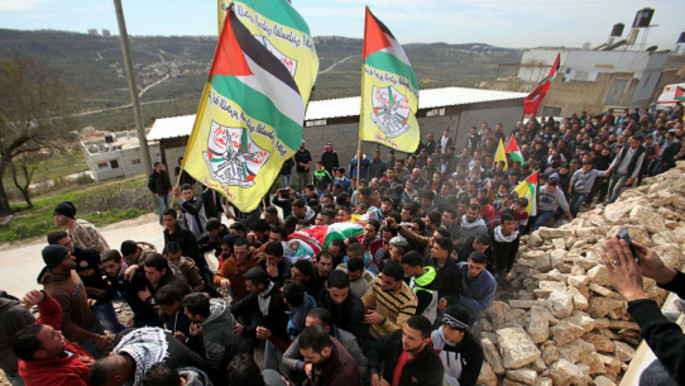Israel lifts Ramallah blockade
Access in and out of Ramallah was sealed off in the early hours of Monday, following an alleged shooting attack by a Palestinian policeman at a checkpoint near the city which wounded three Israeli soldiers on Sunday.
The Israeli military blocked entry into the Palestinian economic and political hub for "situation assessments."
"The crossings to and from Ramallah have returned to normal activity," the Israeli forces said in a statement.
Palestinians veiwed the blockade as collective punishment for the act of one individual, as thousands faced disruptions to their commute to Ramallah.
"They shouldn't punish the entire governorate of Ramallah for a policeman who carried out an attack," said Adnan Damiri, a Palestinian police spokesman.
Meanwhile, thousands of Palestinians gathered to pay respect to Palestinian policeman Amjad Sukkari, who allegedly shot at Israeli troops at a West Bank checkpoint before he was fatally shot by Israeli forces on Sunday.
 |
|
|
Palestinians carry the body of police officer Amjad Sukka [Anadolu] |
Nablus governor Akram Rajoub was among the mourners who gathered in Nablus on Monday.
"It doesn't mean I agree with what [Sukkari] has done," Rajoub said. "I'm against policemen carrying out attacks, but we are people who respect their martyrs and dead."
Peace prospects
UN Secretary-General Ban Ki-moon expressed concerned over a stalemate in the peace process between Israel and Palestinians is reaching the point of no return for a two-state solution.
"The time has come for Israelis, Palestinians and the international community to read the writing on the wall: The status quo is untenable," Ban wrote in an opinion piece published in the New York Times on Sunday.
"Keeping another people under indefinite occupation undermines the security and the future of both Israelis and Palestinians," he said.
Proposals for an international peace conference were put forward by French foreign minister Laurent Fabius set to bring together Palestinian and Israeli parties to determine a way forward with the two state solution.
France will recognise a Palestinian state if the talks are unsuccessful, its Foreign minister announced on Friday, in a move that angered the Israeli Prime Minister.
"We are prepared to enter direct negotiation without preconditions and without dictated terms," Binyamin Netanyahu said on Monday.
The Palestinians seek an independent state in the West Bank, Gaza and East Jerusalem, areas Israel captured in a 1967 war.





 Follow the Middle East's top stories in English at The New Arab on Google News
Follow the Middle East's top stories in English at The New Arab on Google News
![Israeli forces ordered bombed Gaza's Jabalia, ordering residents to leave [Getty]](/sites/default/files/styles/image_330x185/public/2176418030.jpeg?h=a5f2f23a&itok=_YGZaP1z)

